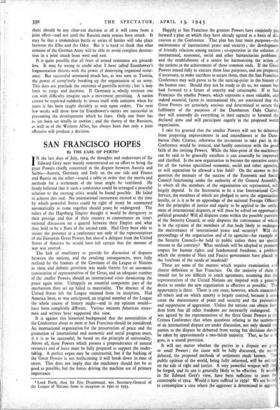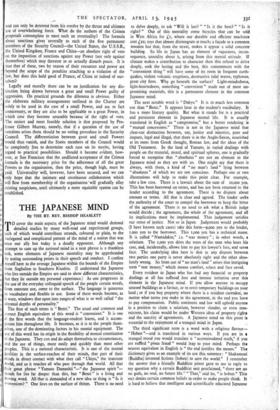SAN FRANCISCO HOPES
By THE EARL OF PERTH* N the last days of July, 1914, the thoughts and endeavours of Sir I Edward Grey were mainly concentrated on an effort to bring the great Powers chiefly concerned in the dispute between Austria and Serbia—Austria, Germany and Italy on the one side and France and Russia on the other—round a table in order that the merits and methods for a settlement of the issue might be ventilated. He firmly believed that if such a conference could be arranged a peaceful solution to the existing crisis would be found possible. He failed to achieve this end. No international instrument existed at the time by which powerful States could by right of treaty be summoned automatically to come together should peace be endangered. The rulers of the Hapsburg Empire thought it would be derogatory to their prestige and that of their country to countenance an inter- national discussion on a quarrel between their Empire and what they held to be a State of the second rank. Had Grey been able to secure the presence at a conference not only of the representatives of the European Great Powers but also of a delegate from the United States of America he would have felt certain that the menace of war was averted.
The lack of machinery to provide for discussion of disputes between the nations, and the resulting consequences, were fully realised by the framers of the Covenant of the League of Nations in 1919, and definite provision was made therein for an automatic convocation of representatives of the Great, and an adequate number of the .maller Powers, should an international crisis threatening the peace again arise. Unhappily an essential component part of the mechanism then set up failed to materialise. The absence of the United States left the League maimed from its inception. Had America been, as was anticipated, an original member of the League the whole course of history might—and in my opinion would— have been completely different. Various eminent American states- men and writers have supported this view.
It is against this historical background that the potentialities of the Conference about to meet at San Francisco should be considered. An international organisation for the preservation of peace and the promotion of international and economic and social progress must, if it is to be successful, be based on the principle of universality. Above all, those Powers which possess a preponderance of natural resources and of force must be fully prepared to support the under- taking. A perfect organ may be constructed, but if the backing of the Great Powers is not forthcoming it will break down in time of stress. This does not imply that the machinery should not be as good as possible, but the forces driving the machine are of primary importance.
* Lord Perth, then Sir Eric Drummond, was Secretary-General of the League of Nations from its inception in 1920 to 1933.
Happily, at San Francisco the greatest Powers have conjointly put forward a plan on which they have already agreed as a basis of dis-
cussion at the Conference. That plan has four main purposes—the
maintenance of international peace and security ; the development of friendly relations among nations ; co-operation in the solution of
international, economic, social and other humanitarian problems ;
and the establishment of a centre for harmonising the action of the nations m the achievement of these common ends. If the Great
Powers intend fully to execute these four purposes, and are prepared,
if necessary, to make sacrifices to secure them, then the San Francisco Conference may well prove to be the turning-point in the history of
the human race. Should they not be ready to do so, we cannot but look forward to a future of anarchy and catastrophe. If at San Francisco the smaller Powers, which represent a most valuable, and
indeed essential, factor in international life, are convinced that the Great Powers are genuinely anxious and determined to secure the fulfilment of the purposes of the Dumbarton Oaks Charter, they will assuredly do everything in their capacity to forward the declared aims and will participate eagerly in the proposed world organisation.
I take for granted that the smaller Powers will not be debarred from proposing improvements in and amendments to the Dum- barton Oaks Charter, otherwise the invitations to take part in the Conference would be ironical, and hardly consistent with the good faith of the inviting Powers. While the blue-print of the machinery can be said to be generally excellent it can assuredly be improved and clarified. Is the new organisation to become the operative centre for all the various specialised economic, social and other agencies, or will separatism be allowed a free field? On the answer to this question the measure of the success of the Economic and Social Council functioning under the authority of the General Assembly, in which all the members of the organisation are represented, will largely depend. Is the Secretariat to be a true International Civil Service, the members of which are pledged to serve the organisation loyally, or is it to be an appendage of the national Foreign Offices? Are the principles of justice and equity to be applied to the settle- ment of international disputes, or will these be solved on opportunist political grounds? Will all disputes come within the possible purvieW of the Security Council, or only disputes the continuance of which is in the opinion of the members of that body likely to endanger the maintenance of international peace and security? Will the proceedings of the organisation and of its agencies—for example of the Security Council—be held in public unless there are special reasons to the contrary? What methods will be adopted to promote respect for human rights and fundamental freedoms, a problem which the systems of Nazi and Fascist government have placed in the forefront of the needs of mankind?
These are some of the matters which require examination and clearer definition at San Francisco. On the majority of them it should not be too difficult to reach agreement, assuming that the representatives of the United Nations are inspired with a genuine desire to render the new organisation as effective as possible. The opportunity is there. There is one issue, however, which transcends all others and on which anxiety is largely centred, because it con- cerns the maintenance of peace and security and the prevention and suppression of aggression. Unless the nations can obtain. free- dom from fear all other freedoms are necessarily endangered. It was agreed by the representatives of the three Great Powers at the Crimea Conference that when questions relating to the settlement of an international dispute are under discussion, not only should the parties to the dispute be debarred from voting but 'decisions should be taken by approximately a two-thirds majority. That, so far as it goes, is a sound provision.
It will not matter whether the parties to a disPute are great or small Powers ; the cause will be fully discussed, the merits debated, the proposed methods of settlement made known. The public opinion of the world, being fully informed, will be enlisted on the side of right and justice. A very powerful weapon will thu be forged, and its use is generally likely to be effective. It would, in Sir Edward Grey's view, have- been sufficient to avert the catastrophe of 1914. Would it have sufficed in 1939? We are bound to contemplate a case where the 'aggressor is determined to aggress,
and can only be deterred from his resolve by the threat and ultimate use of overwhelming force. What do the authors of the Crimea proposals contemplate to meet such an eventuality? The formula about sanctions gives severally to each of the five permanent members of the Security Council—the United States, the U.S.S.R., the United Kingdom, France and China—an absolute right of veto on the imposition of sanctions against any Power (not only against themselves) which may threaten to or actually disturb peace. It is true that of these, two by reason of their resources and power are beyond the scope of the penalties attaching to a violation of the law, but does this• hold good of France, of China or indeed of our- selves?
Legally and morally there can be no justification for any dis- tinction being drawn between a great and small Power guilty of aggression. On practical grounds the dilemma is obvious. Either the elaborate military arrangements outlined in the Charter are solely to be used in the case of a small Power, and are in fact unnecessary, or they are also to be applicable to a great Power, in which case they become unusable because of the right of veto. The easiest and most feasible solution is that proposed by Pro- fessor Gilbert Murray, namely, that if a question of the use of sanctions arises there should be no voting procedure in the Security Council. The differentiation between great and small Powers would thus vanish, and the States members of the Council would be completely free to determine each case on its merits, having regard to practical possibilities. Should it become evident, how- ever, at San Francisco that the undiluted acceptance of the Crimea formula is the necessary price for the adherence of all the great Powers to the organisation, then the price, though high, must be paid. Universality will, however, have been secured, and we can only hope that the intimate and continuous collaboration which will flow from membership of the organisation • will gradually allay existing suspicions, until ultimately a more equitable system can be established.



























 Previous page
Previous page